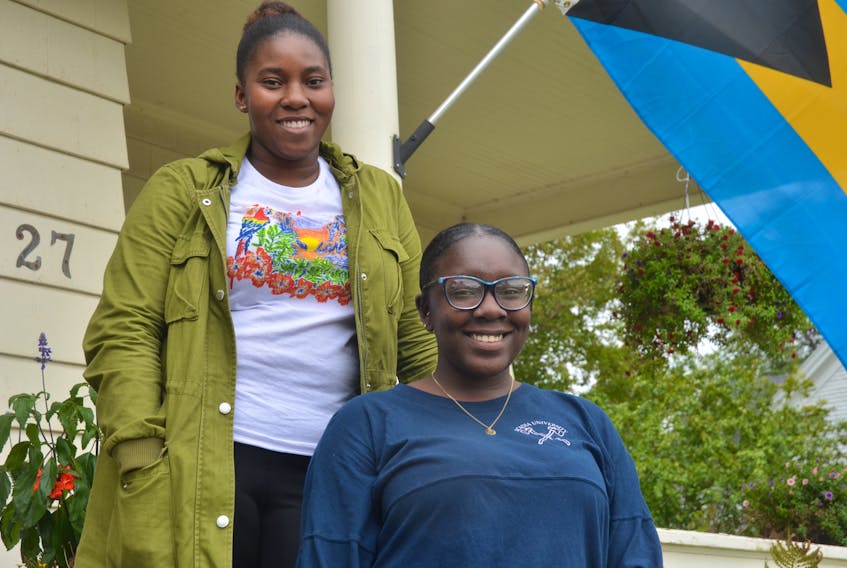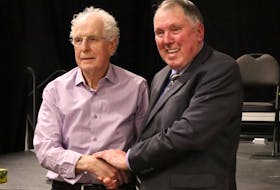WOLFVILLE, N.S. — The hardest thing for Ronniciea “Nicie” Saunders as reports rolled in of hurricane Dorian flooding and ravaging the Bahamas with vicious winds was her inability to do anything.
Thousands of miles away in Wolfville, where classes for the year had just started at Acadia University, she found herself in frustrated, fearful and shocked.
“We’ve had hurricanes before. We’ve even had Category 5s before, but I didn’t expect the outcome we got,” Saunders said Sept. 12.
She knew her family and other Bahamians had done everything they could to prepare for the hurricane. They’ve been through this before.
Saunders has seen other hurricanes. She also dealt with the stress of being away at university as her family and friends back home contended with hurricane Matthew in 2016.
But all that preparation and experience did nothing to buffer the shock of the flooding and winds being so severe that the central region of Grand Bahama started to flood.
“We weren’t expecting that much water. We thought it would mostly effect the outer settlements. When the central parts of Grand Bahama started to flood, we realized it was worse than expected,” Saunders said.
At first, Saunders’ father kept her apprised of what was going on. He provided her with regular updates from the family home in Abaco.
“I have family in both Abaco and Grand Bahama. When the storm began initially, I talked to my dad a lot, because the hurricane went through Abaco first,” Saunders said.
However, Abaco was one of the first and hardest-hit areas in the Bahamas. That vital line of communication was severed.
Saunders said she kept herself calm, telling herself “no need to panic as of yet,” but when footage emerged of the extent of the destruction Dorian had wrought, leveling entire settlements, “the panic really came through. It was then that it started to get frightening.”
Saunders began to ponder what was going on - and fear for her father’s safety.
“I thought, ‘Is my house getting destroyed?’ I’d see footage of water near my house and think, ‘Is that an early or late warning? Are they actually going to get out?’ I knew people didn’t get out in time in certain areas,” Saunders said. “When you step outside and you see water coming toward you on your left and water coming toward you on your right, you have to go back into your house. It may just be the safest place at that time.”
Saunders was able to keep in touch with other family members in Grand Bahama for a bit. It was through that correspondence that she learned her father had to evacuate the family home, which flooded.
She kept up on what was going on through group chats with family members in Grand Bahama as long as she could but, eventually, Dorian cut that line of communication as well.
Saunders contacted a cousin in Nassau, and they collaboratively worked to gather as much information as possible. They called everyone from the United States Coast Guard to emergency hotlines, analyzing social media, news footage and WhatsApp messages, to figure out the extent of the damage. These efforts provided them, and others, with an idea of what was going on as Dorian raged on.
Saunders felt compelled to do this. She could do nothing else to help people affected by the storm.
“We were trying to help any way we could, being away from home,” Saunders said. “We were not experiencing it directly, but it hurts to know your homes and families are there and we were just looking at the destruction.”
Saunders wasn’t the only Bahamian plagued by constant worry.
“I feel as though something that disastrous really does put a strain on your mental health,” she said, noting Bahamians at Acadia, in some cases, couldn’t sleep or eat because they were so distraught over what was happening.
“Some people didn’t want to disconnect with their families because they wanted to stay in touch,” Saunders said. “In a way, they were saying, ‘if this is my last time talking to you, I want to savour the moment.’”
ONGOING NIGHTMARE
Saunders is reluctant to say the worst is over now that the storm is past because the troubles for the people of the Bahamas are far from over.
With tremendous cost in human life, devastated infrastructure, basic services like water unavailable and widespread power outages, it will be a long, hard slog to restore the Bahamas to its former glory.
“It seems as if we can’t get a break. It’s still hurricane season, people are homeless, and Abaco is almost completely evacuated” Saunders said. “I’d say a lot of side effects came with the hurricane that have yet to be solved.”
Saunders said morale is low, with homes destroyed and families divided by mass evacuations and death.
“The worst has passed but spirits have not been uplifted yet,” she said. “The Bahamas is still going through a nightmare.”
HOW TO HELP
Acadia University, moved by what happened, sought to collaborate with its Bahamian community to offer a glimmer of hope in dark times.
The Annapolis Valley-based post-secondary institution has launched a Bahamian Student Relief Fund.
This fund will support students from the Bahamas, with a focus on those from Grand Bahama and Abacos, the islands hit hardest by hurricane Dorian. In addition to the fund, there has been a groundswell of support from the community in the form of donations to those affected in the Bahamas.
Saunders had high praise for all efforts to help from Acadia and the broader Wolfville community, noting she and others have spent long hours into the night sorting a litany of donations to the Bahamas.
“It gives us comfort, knowing we’re not just stationery and at a standstill,” Saunders said. “We might not be home to cope, but the relief efforts at Acadia have been our coping mechanism. It’s good to be able to help in any way we can, so it doesn’t feel like we’re abandoning our families in this time.”
Acadia is encouraging alumni and the broader community to contribute to the fund as well.
There are 145 students from the Bahamas registered at Acadia for the 2019-20 academic year.
To donate to the Bahamian Student Relief Fund, visit https://www2.acadiau.ca/custom/donation/index.php?program=Bahamian%20Student%20Relief%20Fund.
For more information the fund, contact Moira Crowell at [email protected].









